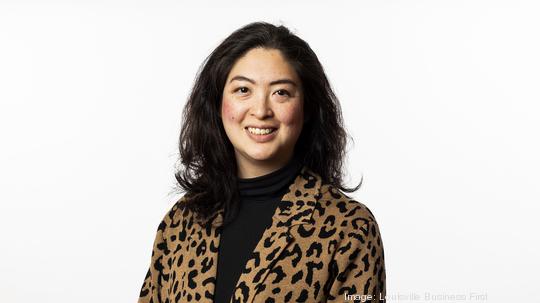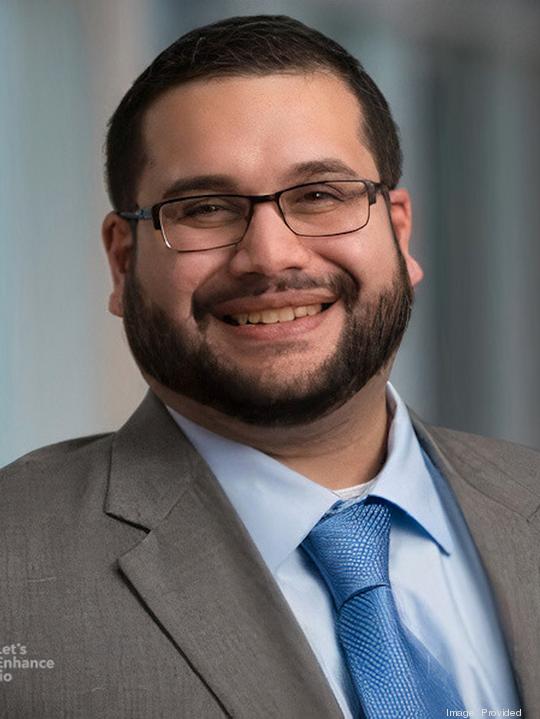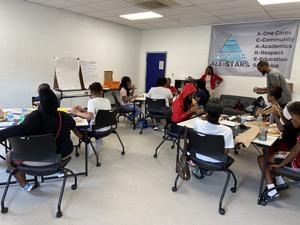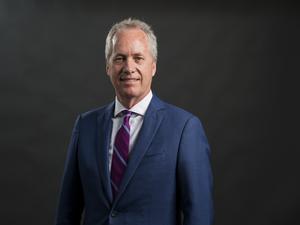
Louisville was recently recognized as a "Digital Inclusion Trailblazer," one of only 31 cities in the nation to earn the title from the National Digital Inclusion Alliance.
It's an honor roll of sorts, spotlighting local government initiatives that promote digital literacy and broadband access for underserved residents. The Trailblazer cities also serve as a model for others looking to take on similar initiatives.
And while it may look like just an award for Louisville Metro Government, it actually represents more than a decade of work.
Grace Simrall, chief of civic innovation and technology at Louisville Metro Government, told me the digital inclusion efforts arose as the city was determining what its residents needed to thrive. High-paying jobs were a big priority, and many of those jobs were and continue to be in the technology sector.
"From a very early point of the administration, we had been looking at what are the barriers for people to obtain those high-paying tech jobs," Simrall explained.

Early research found that Louisville simply didn't have enough digital equity, she continued. For example, there was a lack of access to broadband. But back in 2011, it was difficult to get data on what those needs looked like.
As a result, Louisville Metro Government took on two major initiatives: Louisville Fiber, which was mapping the demand for fiber internet, and the Louisville Speed Test, a crowdsourced look at internet speeds in the city. Those mapping and data gathering efforts continued through 2016.
While many cities were just focused on if residents could access broadband at home, Louisville Metro took a different approach.
"We knew that wasn't enough," Simrall said. "Just because it's available, just because they can buy it, doesn't mean that it works. It doesn't mean that you have a machine that can take advantage of it."
There was also the skills piece, Simrall said, noting that even if some had access to broadband and a computer, they might not have had the training needed to get those in-demand tech jobs.
So when the city stood up its digital inclusion plan in 2016, it looked to solve for those three issues: Access to fast, affordable internet; access to computers and other devices to use it; and the skills training to earn a paycheck from it. The plan was unfunded, Simrall said, and a lot of the research and development came from the sweat equity her office put in.
That plan was still in its pilot stages when Ricky Santiago, digital inclusion manager at Louisville Metro Government, came on board in October 2018. Since then, he's worked to formalize partnerships and digital inclusion programs for digital equity with 17 local nonprofits, which are teaching both basic and more advanced digital skills.

Organizations collaborating with Louisville Metro Government are: Americana Community Center, Somali Community of Louisville, Catholic Charities, KY Refugee Ministries, Somali Bantu Community of Louisville, Youthbuild, Wesley House, See Forward Ministries, KY African Achievers, South Louisville Community Ministries, Goodwill Industries of Kentucky, Louisville Metro Housing Authority, Louisville Free Public Library, Options to Success, NAMI Louisville, Doors to Hope, Kentuckiana Works (Code Louisville and Tech Louisville) and, most recently, Volunteers of America, which just opened a resource lab.
The city has also helped establish computer labs with non-partner organizations, including Educational Justice, Center for Women and Families and the Backside Learning Center.
According to 2020 data from the U.S. Census Bureau, about 91% of households in the Louisville metro area have a computer and about 86% had a broadband internet subscription between 2016 and 2020. Across Kentucky, 86% of households have a computer and 82% had a broadband internet subscription within that same period.
Comparatively, about 87% of Jefferson County households had a computer and about 81% had broadband between 2014 and 2018. Only about 74% of Kentuckians had access to the internet at home a decade ago, Census data show.
But digital inclusion goes beyond surface-level metrics, Santiago said.
"Bias training and anti-racism is great as an educational tool, but digital inclusion, digital equity is the empowerment," he said.
Santiago said in the beginning, many were unaware of the digital divide, so he was having conversations about the lack of computers or internet access in pockets of the city. But the coronavirus pandemic made everyone acutely aware of those issues, as schools shifted to online learning and many businesses went remote.
"Covid shined a light on the digital divide, most certainly, and the work that went in with JCPS, the city and nonprofits sort of confirmed our numbers," he said. "But where do we go from here? We need to continue to build on the progress that has been made on the divide through Covid so we're not in a place worse off after Covid."
Now, those conversations have shifted towards solutions and aligning resources, Santiago continued. The city acts as both a connector and champion of those efforts.
For example, more than 45,000 Louisvillians have signed up for the Affordable Connectivity Program (ACP), a $14 billion benefit program from the Federal Communications Commission. It began as an emergency benefit during the pandemic, but has become a permanent stipend, offering $30 per month toward internet service for eligible households and $100 to purchase a laptop or desktop computer.
Both AT&T and Spectrum have committed to having a $30 internet plan that gets 100 megabits download and 20 megabits uploading speeds.
Simrall said the city is estimating that those 45,000 sign-ups represent about half of the local families that have reported that they are not connected. About 1,300 families have been able to purchase a device with the ACP benefit.
Eric Burnette, director of innovation at Louisville Metro Government, aided in the development of LouTechWorks and the Future of Work Initiative.

LouTechWorks, formed in 2019, brought together six universities: Bellarmine University, Indiana University Southeast, Ivy Tech Community College, Jefferson Community and Technical College, University of Kentucky and University of Louisville, as well as Jefferson County Public Schools, Code Louisville and Tech Louisville through a shared goal of accelerating the organic growth of the local tech talent pipeline.
There is still a high demand for skilled tech workers in Louisville, recent data indicates. According to CompTIA, an IT trade association, there were a total of 916 tech job postings in the metro area in September alone. The local employers with the most tech jobs postings are Humana, KPMG, PricewaterhouseCoopers, Deloitte and United Parcel Service Inc.
The Future of Work Initiative, led by Alisia McClain, has had successes of its own, including the Butterfly Project, an internship that pairs local high school and college students in demographic groups underrepresented in design and data skills with community issues and partners to apply skills in data and technology that lead to a more equitable community.
"Code Louisville, by itself, has contributed significantly to the GDP of Louisville over the last six or seven years," Burnette said. "And if you look at where people who went through the Butterfly Project are going to be in the next five years, I think we're going to see the same thing."
That's good news for businesses, many of which need tech talent, even if they aren't the standard "tech" company.
"Digital transformation is going to happen, whether we like it or not — the future is coming," Santiago said. "We need to make sure that the families that don't have access are prepared for that, and digital equity and digital inclusion is that work."
This week is Digital Inclusion Week, which will end Friday, Oct. 7 with the Louisville Regional LatinX Digital Equity Summit. The free event will be held at the South Central Regional library. You can register here.









